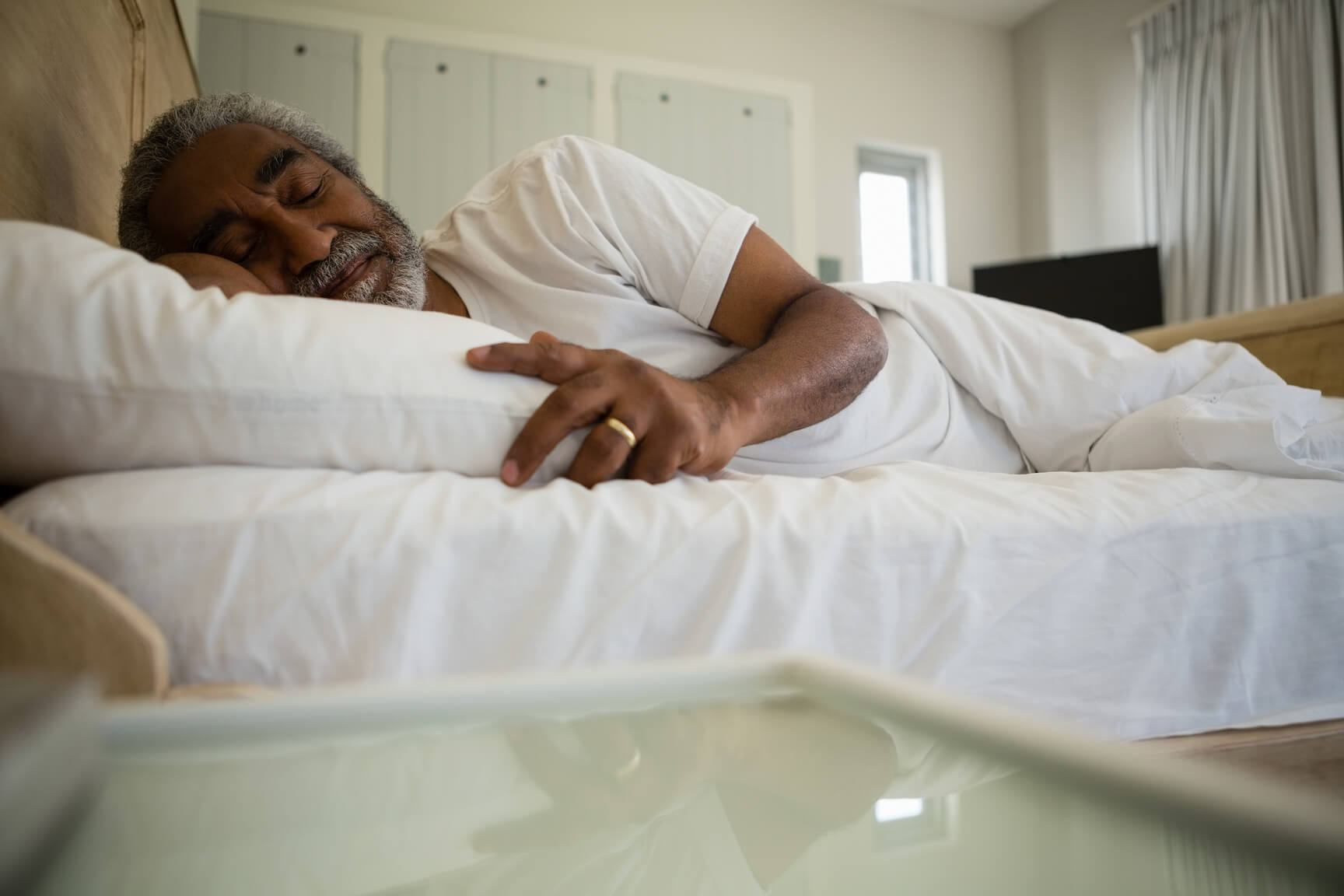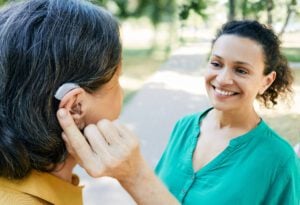Living well with diabetes in later life
Tags
Complex CareLiving Well
It’s estimated that over a third of people with diabetes in the UK are over 65 years of age. That’s around 1.5 million people. Diabetes can increase the risk of developing other health complications such as stroke. People can become weaker and more frail in later life too which can make managing diabetes independently at home more difficult. And, older people with diabetes are more likely to end up in the hospital when they’re not well. As such, it is crucial older people have access to the right support and resources to live well with the condition – from how to stay organised and claiming prescriptions, to looking after their mental health.
We’ve gathered the latest expert advice from leading diabetes organisations below.
Life with diabetes – Managing your feelings
Living with diabetes can sometimes feel like a full-time job, and as such people may experience feelings of anxiety, stress or burnout from time to time. However, stress can impact your blood sugar levels so being able to manage and process how you’re feeling is key to your wellbeing.
An important step in maintaining a positive mindset and quality of life is choosing to focus on the things that you can control in your daily life. This might include –
Being organised
- Keeping important numbers such as emergency contacts and healthcare professionals up to date and in a handy place
- Arranging travel to appointments ahead of time, and asking someone to come with you for support if you need it
- Making sure you have repeat prescriptions for any diabetes medication and enough supplies in the lead-up to bank holidays, or if you’re planning a trip
Living a healthy life
- Making good choices when it comes to your diet – ensuring you’re following a balanced diet and eating a wide variety of foods
- Following a good nighttime routine that helps you get enough quality sleep
- Doing regular physical activity that suits your ability level
Looking after your mind
- Keeping in touch with friends and family, especially if you’re spending a lot of time at home
- Saying no to things if you need time to rest and recharge
- Taking a break from things like the news or social media if it’s having a negative impact on your mood
- Talking about how you’re feeling on low days. If you feel unable to talk openly to a friend, family member or your GP, you may be more comfortable talking to people online via Diabetes UK’s community forum
Claiming free prescriptions and eye tests
If you’re over 60 years old you’re automatically for free prescriptions in England. In Scotland and Wales, everyone is eligible for free prescriptions as long as they’re registered with a local GP and the medicines are dispensed from a pharmacy in the same country.
For people under 60 in England, the current prescription charge is £9.65 per item. This can quickly add up if you’re taking lots of different medications and will be for the rest of your life. If you’re prescribed insulin or any medication to manage diabetes, you can apply for a medical exemption certificate which will entitle you to free prescriptions. It’s worth applying for as you’ll be able to claim prescriptions for all medication medication (even those unrelated to your diabetes) for free.
People with diabetes may be entitled to free NHS dental treatment too. The NHS has a free tool where you can check if your current health needs make you eligible for free prescriptions or dental services.
Because diabetes can affect the eyes you’ll likely be eligible for free NHS sight tests. You may need to bring some form of proof of your eligibility to your optician appointment, such as an Endocrinology appointment card, a repeat prescription card for your diabetes medication, or your medical exemption certificate.
Safe driving and diabetes
Many people with diabetes can continue to drive normally for a long time after diagnosis. However, there are some situations where it may no longer be safe to hold a driving licence. For example, if you’re at risk of hypoglycaemia/hypo while awake – where your blood sugar drops below 4mmol/l it may affect your visual fields, or cause you to feel dizzy. You may also experience impaired awareness or confusion, making it dangerous to drive.
Diabetes UK states that if you take insulin for more than three months you should tell the DVLA. You may need to apply for a restricted licence. If you’ve experienced more than one severe hypo i.e. one that required help from someone else to get it under control – in the last 12 months you should stop driving and tell the DVLA as this potentially puts you are risk of hypos in the near future. Your licence may be temporarily revoked, but you can usually reapply in a few months.
It’s really important for everyone’s safety that you inform the DVLA of your situation as soon as you can. Withholding information about a medical condition that affects your driving ability can carry a fine of up to £1000.
You can find out more about driving regulations and diabetes here.

Creating a healthy diet
According to the NHS, often diabetes doesn’t require a ‘special’ diet – just a healthy one, which may look something like this –
- One type of starchy food with each meal, e.g wholegrain bread or rice, potatoes, pasta, and cereals
- Around three servings of dairy foods a day, e.g milk, yoghurts or cheese
- Two types of protein foods a day, e.g meat, fish, eggs or beans. one or two portions of oily fish like salmon, sardines or pilchards each week is recommended.
- Five portions of vegetables and fruit a day (portion size is usually equal to a handful), this could include fresh, tinned and frozen
A low carb diet, or consistency and tracking your carb intake is recommended by the NHS too. They advise keeping your portion of carbohydrates similar for each meal and using tools like Carbs&Cals, to help you keep your blood glucose within target range. and, While the NHS say you don’t need to completely avoid sugar and sweets, these foods can also quickly increase blood sugar levels, so moderation here is key too.
It’s also important to understand that everyone’s nutritional needs will be slightly different. Older people are more often underweight than overweight, and therefore reducing fat and sugars may not always be the right course of action. Poor or irregular eating may also increase the likelihood of hypos, so ensuring there are plenty of nutritional snacks available throughout the day can be really important.
If you’re not confident in the kitchen or are unsure how to maintain a healthy diet, diabetes UK has a huge library of diabetes friendly recipes, suited to people with type one, type two, or another form of diabetes.
Staying active
Keeping active has a wide range of benefits for older people with diabetes. It can help strengthen ageing muscles and improve balance, reducing the risk of falls. Regular activity may also help the body use insulin better, and increase the amount of glucose the muscles use for energy.
Diabetes My Way, run by the NHS suggests the following as beneficial exercises for people over the age of 65, who are generally fit with good mobility –
- 150 minutes of aerobic activity a week, e.g walking or cycling
- Exercises that improve strength and flexibility twice a week, e.g yoga, working with resistance bands, or something as simple as carrying shopping bags
For people with limited mobility or are housebound a physiotherapist will usually be able to offer a regime of gentle chair-based exercises, which can be supported by carers.
Your activity level will depend on your overall health, and you shouldn’t begin a new exercise regime without discussing it with your GP first.
Getting a good night’s sleep
Sleep problems can be common in people with diabetes so creating a calming routine before bed can make a big difference. Experts recommend adults get between 7-9 hours of sleep each night. The following may help –
- Ensure your bed is comfortable enough and pillows are the right height
- Keep the room on the cooler side (around 18C), you may wish to keep a small window open so that fresh air can flow in
- Make the room dark enough using blackout curtains or a sleep mask
- Avoid drinking alcoholic drinks before bed as this can impact your sleep pattern
- Avoid using artificial lights and screens before bed as they can confuse the body’s natural clock
- Stick to a regular bedtime

How live-in care can help
Some older people struggle to manage day-to-day tasks in their own homes at the best of times, but if they’ve also been diagnosed with diabetes it can become even harder to cope.
Diabetes can be a draining condition, particularly as weight loss and loss of muscle density can leave the sufferer feeling weak and unable to carry out the more physical tasks they once used to do.
If a person is living with diabetes but would prefer to stay in their own home rather than enter a care or nursing home, then live-in care could be the answer.
With such an arrangement in place, a live-in carer will move in and provide them with the right level of support and companionship needed to live as independent a life as possible. If a person is no longer able to drive safely, a carer can provide lifts, accompany them on public transport, or help them arrange taxis so that they can remain active in their community.
A live-in carer will have the knowledge and skills to prepare the specially balanced diet which people with diabetes need to maintain, and could even help them to increase their levels of physical fitness by getting them out and about, accompanying them on walks or encouraging activities such as gardening. Maintaining their physical strength and ensuring that they get plenty of exercise is extremely beneficial in the management of diabetes.
A carer can also offer reminders when it’s time for the person they support to self-check their blood glucose levels or take their diabetes medications. They can help ensure medications are stored correctly too.
Because a live-in carer will be around during both the day and night, they can look out for symptoms of a hypoglycaemic attack (hypo) and raise the alarm so that medical assistance arrives as fast as possible.
A hypo can be more difficult to spot in older age, the signs to look out for, according to Diabetes UK include difficulty concentrating, personality changes, morning headaches and trouble sleeping.
If your loved one has been diagnosed with diabetes and you think that they could benefit from a care at home package, simply get in touch with the team at Elder today.
With carers specially trained in the treatment and care of diabetes patients, we can create a tailor-made live-in care plan which will enable your loved one to remain living independently in their own home and to receive all the help they require to manage their condition.
Read more about complex care

Can I arrange nursing care at home?
Nursing care is provides care and treatment to people with complex medical conditions, but is it possible to receive it at home? We take

Living well with diabetes in later life
It’s estimated that over a third of people with diabetes in the UK are over 65 years of age. That’s around 1.5 million people.

Caring for different types of hearing loss
According to Age UK, hearing loss affects around 12 million adults in the UK. People with hearing loss may not always require specialist care

Vision loss in older people – Is there a cure, and how can it be cared for?
Vision Loss Care: Is There a Cure? Your loved one may develop signs of vision loss as they grow older. However, there are ways

Motor neurone care: How do I care for a loved one with motor neurone disease?
Motor Neurone care: How do I care for a loved one with Motor Neurone Disease? A diagnosis of Motor Neurone Disease, commonly referred to

Arthritis in the elderly – causes and care options
Arthritis Care: What Causes Arthritis in the Elderly? Arthritis, which causes painful and inflamed joints, can affect anyone at any age. However, we